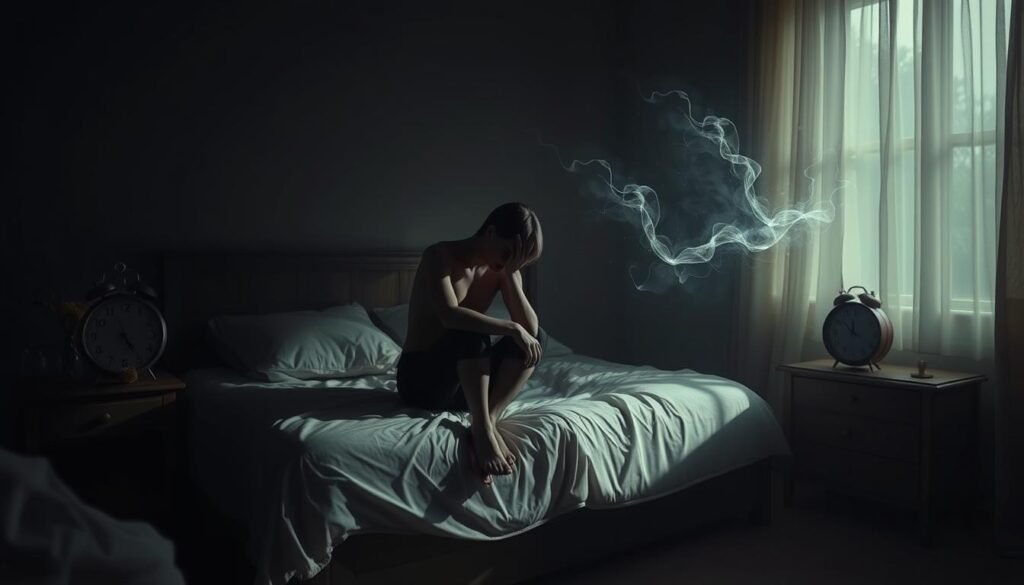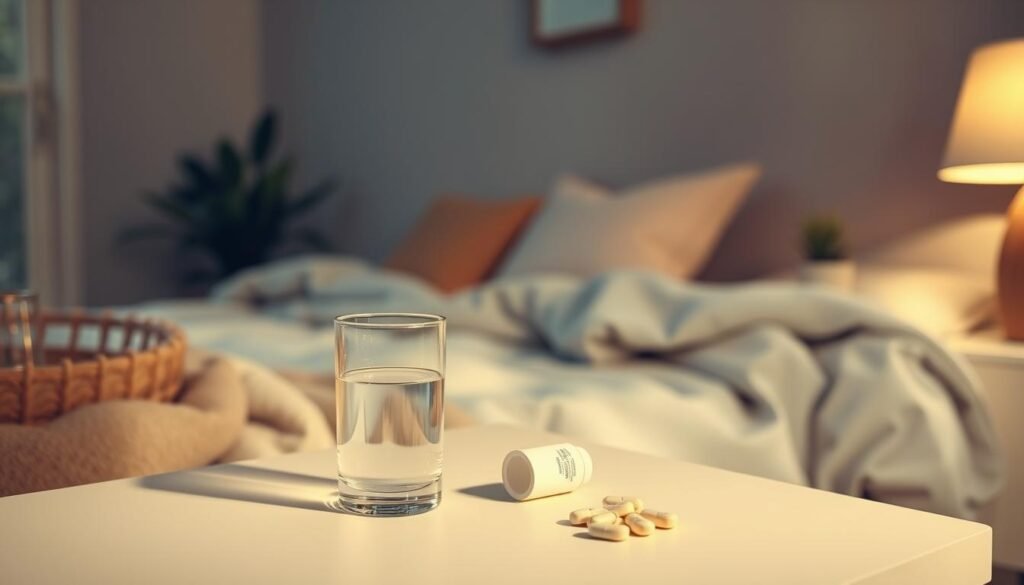A study shows about 24% of Zoloft users report insomnia. This highlights how the drug can affect sleep and energy. Zoloft is used to treat mental health issues like depression and anxiety. Knowing how it impacts sleep is important for managing side effects and improving treatment results.
Zoloft can disrupt sleep as it works to improve mood. It’s key for patients to know the side effects, which include nausea and tiredness. Dealing with Zoloft insomnia can make life better. Making changes in dose and lifestyle can address sleep and energy issues. This knowledge helps users better handle their treatment.
Key Takeaways
- Zoloft can cause insomnia and impacts energy levels.
- Common side effects include nausea and fatigue.
- Adjusting lifestyle habits can mitigate Zoloft insomnia.
- Understanding Zoloft side effects is key for effective management.
- Patients may notice an improvement in symptoms after a few weeks of treatment.
Understanding Zoloft: An Overview
Zoloft is known by its scientific name, sertraline. It’s part of the selective serotonin reuptake inhibitors (SSRIs) group. This medication helps people deal with depression, anxiety disorders, and some obsessive-compulsive behaviors. It’s trusted by millions around the world for improving mental health, showing its importance in today’s mental health care.
The way sertraline works is by blocking the reabsorption of serotonin, a key mood regulator. By keeping more serotonin available in the brain, it helps stabilize mood. Studies have found that Zoloft might also help regulate when we sleep and wake up.
Those who use Zoloft often notice they sleep better and longer. They also wake up less during the night. Thanks to reduced anxiety, Zoloft users feel more at ease, making good sleep easier. However, side effects like nausea, dry mouth, headaches, feeling tired, and less interest in sex can happen. These usually go away as the body gets used to sertraline.
Getting to know how Zoloft works is key to using it wisely. Working closely with a healthcare provider helps manage treatment well and deal with any problems.
What is Sertraline and How Does it Work?
Sertraline, also known as Zoloft, is a key antidepressant medication. It mainly helps improve the way serotonin works in the brain. Serotonin is important for mood balance.
The Sertraline mechanism works by stopping serotonin from being taken back up. This action increases serotonin availability. It’s vital for treating depression and anxiety by helping balance emotions.
Sertraline comes in 25 mg, 50 mg, and 100 mg tablets. The usual dose ranges from 50 to 200 mg daily. Doctors start with a small dose and adjust as needed. Full benefits often take several weeks to show, with initial improvements seen in about two weeks.
As part of the SSRIs, sertraline is crucial for mental health treatment. Research shows it’s effective and safe for various conditions. It has improved the lives of many people.
How Zoloft Affects Sleep and Energy Levels
Zoloft is a popular antidepressant that changes how we sleep and feel energy. It can make some people sleep better. But, for others, it might cause trouble sleeping. Knowing how Zoloft could affect you is important if you’re thinking about using it.
Effects on Sleep Patterns
Zoloft works by balancing serotonin, which helps with sleep and mood. When serotonin levels are good, you might sleep more soundly and deeply. Antidepressant sleep disturbances like trouble falling asleep can happen too. These effects vary from person to person. Some may feel extra sleepy, while others might battle insomnia.
How it Influences Daytime Energy
The way Zoloft impacts sleep can impact your energy during the day too. More serotonin can make you feel more tired and less alert. This might make it hard to do daily tasks or to drive safely. About 7% of people say they feel sleepy because of Zoloft.
To deal with tiredness from Zoloft, try keeping a steady sleep routine and stay active. If you’re too sleepy, it’s a good idea to talk to a doctor about it. They can give you advice on what to do.
Zoloft Side Effects: What to Anticipate
Zoloft, a widely used SSRI, helps treat anxiety and depression. It’s key to know the side effects you might face. Early treatment might bring on headaches, nausea, and feeling tired or sleepy. About 31% of adults may experience an anxiety disorder, making Zoloft a common choice.
Zoloft starts working in 2 to 6 weeks. You might see changes in sleep and energy levels in just 1 to 2 weeks. Still, side effects could make some stop taking it within the first three months. Remember, your body usually adjusts after the first couple of weeks.
- Common Zoloft side effects include:
- Headache
- Nausea
- Fatigue
- Dry mouth
- Sleep disturbances
- Less common, yet serious side effects can be:
- Unusual weight loss
- Low sodium levels
- Increased bleeding risk
- Eye pain from glaucoma
- Sexual dysfunction
Zoloft can improve life for many people. Knowing possible side effects helps prepare for treatment. Always talk with your doctor about side effects and how to manage them.
Antidepressant Sleep Disturbances: The Connection with Zoloft
Sleep issues are common for people on Zoloft, a widely used antidepressant. Many face trouble sleeping, have intense dreams, or notice changes in their sleep habits. It’s important to delve into why this happens, especially looking at serotonin’s role in sleep.
Common Sleep-Related Side Effects
Users of Zoloft often share their struggles with sleep. These issues can affect a person’s life in big ways. The side effects include:
- Insomnia: Finding it hard to fall or stay asleep because you feel more awake.
- Vivid Dreams: Dreams may become more real and frequent, related to REM sleep changes.
- Night Sweats: Sweating a lot during sleep is also a common issue.
- Changes in Sleep Quality: You might wake up more often and not sleep deeply.
- Increased Sleepiness: Some people feel sleepy in the daytime because of Zoloft.
Serotonin’s connection with sleep is key to these issues. Zoloft affects serotonin, which helps regulate sleep. Though Zoloft fights depression, it can also lead to trouble sleeping for some users.
| Sleep Disturbance | Description | Possible Cause |
|---|---|---|
| Insomnia | Difficulty falling and staying asleep | Activation of serotonin receptors |
| Vivid Dreams | Increased intensity of dreams | Impact on REM sleep |
| Night Sweats | Excessive sweating during sleep | Potential hormonal changes |
| Increased Sleepiness | Daytime drowsiness | Sedative-acting properties of Zoloft |
It’s critical to tackle these antidepressant sleep disturbances for a better life on Zoloft. Grasping how serotonin and sleep interact can guide us in finding the right solutions for these sleep challenges.
Zoloft and Fatigue: Understanding the Connection
Zoloft, also known as sertraline, is used for mental health issues. However, it can make people feel very tired. This tiredness is most common when someone first starts taking it. As the body gets used to the medicine, this can improve. But for some, the heavy feeling stays longer.
The reason sertraline makes you tired is linked to your sleep. Studies show it can affect the REM part of sleep. The REM stage is crucial for feeling rested. When this gets disrupted, people may not feel as energetic. This is tough for those with chronic fatigue syndrome (CFS), making them feel more tired than usual.
Zoloft has physical side effects like nausea and dizziness. These issues make the tiredness worse. Feelings of being on edge or easily upset can also make daily life harder.
To lessen the tiredness from Zoloft, lifestyle changes can help. Things like exercising, eating well, sleeping well, and staying calm can improve energy levels. If these steps don’t work, your doctor might change your dose or try other medicines.
| Aspect | Impact of Zoloft |
|---|---|
| Fatigue Severity | Common during early treatment; may persist |
| Effects on Sleep | Can alter REM sleep, leading to tiredness |
| Symptoms | Nausea, dizziness, decreased appetite |
| CFS Vulnerability | Higher tendency to experience fatigue |
| Lifestyle Modifications | Regular exercise, balanced diet, quality sleep |
| Healthcare Provider Actions | Dosage adjustment or additional medications |

Zoloft Insomnia: Who is Affected?
Zoloft, a well-known antidepressant, is linked to insomnia in some users. This sleep problem can hurt their day-to-day wellness. Knowing who gets Zoloft insomnia means looking at the different factors that affect sleep.
Risk Factors for Sleep Issues
There are certain factors that make sleep problems more likely with Zoloft. Here are the main ones:
- Pre-existing sleep disorders: People with sleep issues before may find Zoloft makes it worse.
- Dosage levels: Starting doses of Zoloft are usually between 25 mg to 50 mg a day. Higher doses can lead to more sleep problems.
- Individual responses to medication: Everyone reacts to Zoloft differently, affecting their sleep in unique ways.
- Caffeine consumption: Drinking caffeinated drinks after 2 PM can mess up sleep, even hours later.
- Bedroom environment: Keeping a bedroom at around 73.4F is good for sleep.
- Lack of exercise: Getting regular exercise helps people sleep better and longer.
People with Zoloft-related sleep problems may need special strategies to help them sleep better. For more details on sleep and mental health, go here.
Sertraline and Drowsiness: A Common Experience
People taking sertraline often feel very sleepy, especially at the start. This sleepiness can be a big issue for those needing to stay sharp and awake during the day. It’s key to understand how sertraline and drowsiness are linked, and how to deal with this common Zoloft side effect well.
About 10% to 16% of Zoloft users feel tired and drowsy. These feelings usually start in the first few weeks of treatment. But they often get better as your body gets used to the medicine. Sertraline affects certain signals in the brain. This can change how much histamine and acetylcholine you have, leading to sleepiness.
For those having a hard time staying awake, there are ways to cope:
- Keep a regular sleep schedule to sleep better overall.
- Do some light exercise to feel more energetic during the day.
- Avoid eating big meals during the day, as they can make you sleepy.
- Talk to your doctor about adjusting your dose if tiredness doesn’t go away after a few weeks.

If drowsiness affects your everyday life, talking to a doctor might help. They could suggest adding something to help you stay awake or trying a different treatment. Knowing about the risk of feeling tired is important. This way, you can manage it better while on sertraline.
The Impact of Zoloft on Circadian Rhythms
Zoloft, a widely used antidepressant, affects our circadian rhythms and sleep patterns. It interacts with neurotransmitters, essential for our biological clocks. Knowing how Zoloft changes sleep can help us understand its effects on rest quality.
How Sleep-Wake Cycles are Affected
Zoloft changes sleep-wake cycles due to its effects on neurotransmitters. People on Zoloft might:
- Stabilization of Circadian Rhythms: Some find that Zoloft helps them sleep more regularly, improving sleep quality.
- Disruption of Natural Sleep Patterns: However, some might experience trouble sleeping or sleep that is not restful.
- Variability Based on Chronotype: People who are active at night often struggle with sleep while on Zoloft. They may need larger doses than morning people do.
Zoloft’s impact on sleep can significantly affect those battling depression. Sleep problems often go hand in hand with depression, making it worse. Even though Zoloft may improve sleep for some, it challenges others. This highlights the tricky balance between antidepressants and our internal clocks.
Managing Zoloft-Induced Daytime Sleepiness
Zoloft can make staying awake during the day hard. It can lower how much you get done and lessen your life quality. About 10% to 16% of users feel sleepy, and this can last a long time.
Zoloft strategies can help with this sleepiness. Here are some tips:
- Adjust Dosage Times: If you take Zoloft at night, you might not feel as sleepy during the day.
- Incorporate Short Naps: A quick nap in the afternoon can make you feel more awake later.
- Prioritize Sleep Hygiene: Sleeping at the same time every night helps. A calm place to sleep does too.
- Stay Active: Taking short breaks to move around boosts how awake you feel, fighting off Zoloft’s tiredness.
- Mindfulness Practices: Mindfulness and relaxing help clear your head and fight sleepiness.

| Strategy | Description | Expected Outcome |
|---|---|---|
| Adjust Dosage Times | Taking Zoloft in the evening | Reduced daytime drowsiness |
| Incorporate Short Naps | Taking quick naps during the day | Enhanced focus and energy |
| Prioritize Sleep Hygiene | Maintaining a regular sleep schedule | Improved sleep quality |
| Stay Active | Engaging in physical activity | Increased energy levels |
| Mindfulness Practices | Utilizing relaxation techniques | Greater mental clarity |
Talking to a healthcare provider about sleepiness is very helpful. They can tailor advice to suit you. Making life changes and using Zoloft tips can help balance your day.
If Zoloft makes you feel anxious, recognizing this and looking for help is key. You can learn more in this article.
Conclusion
Zoloft, or sertraline, impacts sleep and energy for those being treated with it. It works by boosting the availability of serotonin. This helps improve mood, which in turn, leads to better sleep and more energy during the day.
Many people find that Zoloft improves their sleep, making nights restful and reducing anxiety. But, the way people react to Zoloft can be different. That’s why it’s vital to talk with doctors about how it works for you. They can adjust the dose or find ways to deal with side effects.
Being well-informed helps in managing sleep issues and boosting well-being. For more on how Zoloft can help with sleep, check out this article. Learning about it can help people find the best way to handle their treatment.